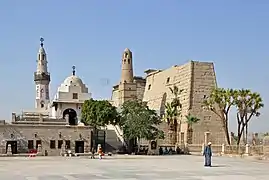Abu Haggag Mosque
The Mosque of Abu Haggag (Arabic: مسجد أبو الحجاج بالأقصر) is a mosque in Luxor, Egypt. Specifically, it stands atop the ruins of Luxor Temple, an Ancient Egyptian centre of worship dating back to the reign of Pharaoh Amenhotep III in the 14th century BC.
.jpg.webp)

Architecture
The mosque stands on the ancient columns themselves. That part of the Luxor Temple was converted to a church by the Copts in 395 AD, and then to a mosque in 640, more than 3400 years of continuous religious worship.[1] Hence, the Luxor Temple is the oldest building in the world at least partially active for other than archeological or tourist purposes.
Yusuf Abu el Haggag
Sheikh Yusuf Abu el Haggag (Arabic: الشيخ يوسف أبو الحجاج; c. 1150 – c. 1245), also al Haggag or Al-Hajjaj was a prophet and holy man whom Egyptians in the town of Luxor celebrate every year, on his mawlid (birthday) known as Mawlid Abu al-Hajjaj al-Uqṣūrī.
Regarded as one of the Ashraf (descendants of the prophet Muhammad,) he was born in Baghdad, later moving to Mecca, and finally settling in the upper Egyptian town of Luxor. He later earned the nickname "Father of the pilgrim." "حاج" (Hajj) in Arabic means "pilgrim" —not to be confused with حج which means "pilgrimage." "حجاج" (Hajjaj,) however, is the word given to someone who performs the pilgrimage frequently and assiduously. Local folklore indicates that he did not build the mosque, but saved it from later attempts by officials to demolish it. Al-Hajjaj died during the reign of sultan As-Salih_Ayyub aged 90.[2]
Mawlid Festival
Residents of Luxor city, on el Haggag's Mawlid, dress up in colourful outfits and attend the mawlid festival for three days. Activities of the festival often include horse races, performances of sufi music and boat rides on three days marking the occasion. El Haggag has descendants who still live in Luxor, though some have left for other places.
References
- Fletcher, Joann (2013). The Search For Nefertiti. Hachette. p. 27. ISBN 9781444780543. Retrieved 21 August 2019.
- "تعرف على تاريخ ومولد ودورة الإمام أبو الحجاج الأقصرى السنوية × 15 معلومة". اليوم السابع (in Arabic).
External links
| Wikimedia Commons has media related to Abu Haggag Mosque. |
